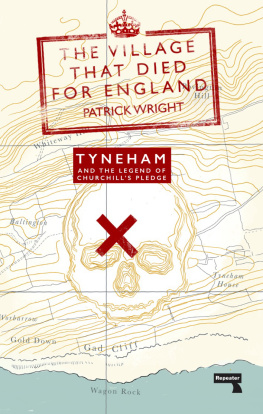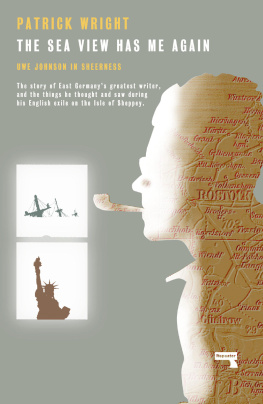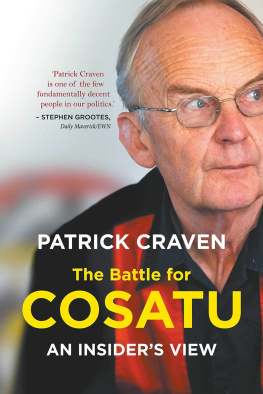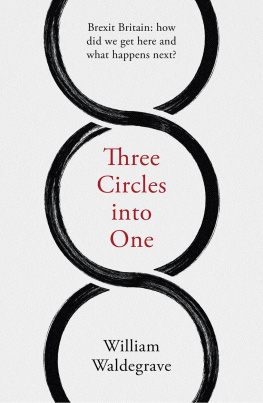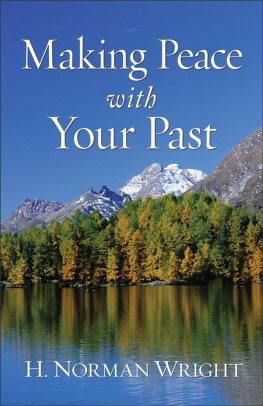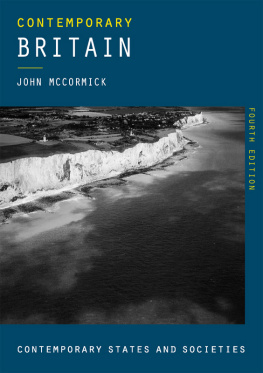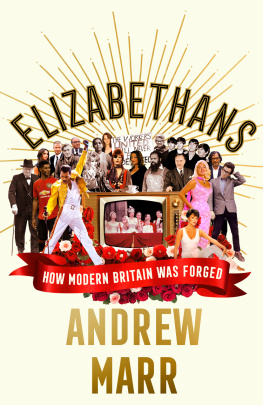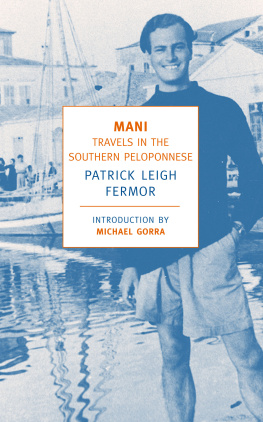On Living in an Old Country
Patrick Wright is the author of a number of highly acclaimed and occasionally also reviled books, including The Village that Died for England, Tank (described by Simon Schama as a tour de force), and Iron Curtain, which John Le Carr hailed as a work of wit, style and waggish erudition and one disconcerted academic described as maddening. Wrights first book, On Living in an Old Country is widely credited with having initiated a new understanding of the heritage industry. Its arguments were further pursued in A Journey Through Ruins, which reviewed the works of Margaret Thatchers governments through their impact on East London, and is now also reissued in an updated edition.
Wright wrote On Living in an Old Country while working for the National Council for Voluntary Organisations. After many years as a self-employed writer and broadcaster, he is now a Professor at the Institute for Cultural Analysis at Nottingham Trent University and a fellow of the London Consortium.
Andrzej Krauze graduated from the Academy of Fine Arts in Warsaw in 1973. His early satirical drawings appeared in the Polish weeklies Szpilki (19701977) and Kultura (19741981). In 1979 he moved to London, where he continues to live. In 1981 he became a contributor to Solidaritys national weekly, Tygodnik Solidarnosc. Seven years later, he started drawing for the Guardian. His illustrations also appear regularly in New Scientist (London), The Scientist (Philadelphia), Internazionale (Rome), Courrier International and Medecine/Sciences (Paris), and in the leading Polish daily Rzeczpospolita, and the weekly Wprost. His character Mr. Pen, introduced in this books chapter on Mary Butts, now flourishes as a citizen of the world.
Praise for On Living in an Old Country:
Patrick Wright is a sensitive, ultra-thoughful explorer With a large torch and copious notes he invites the reader to a number of meandering guided tours well off the main footpaths.
Tom Nairn, The Guardian
A quite exceptional and richly rewarding book You wont feel the same about the Heritage Industry after this devastating series of iconoclastic reflections.
Colin Ward, Times Educational Supplement
Wright is a brilliant analyst of cultural meanings and has uncovered a central truth about the force of nostalgia in modern England.
Paul Addison, London Review of Books
In a rich and suggestive series of essays Patrick Wright explores the ways in which history itself has become the most powerful source of contemporary meanings about what Britain is and what it is to be British.
Stuart Hall
On Living in an Old Country
THE NATIONAL PAST IN
CONTEMPORARY BRITAIN
PATRICK WRIGHT
With drawings by
Andrzej Krauze


Great Clarendon Street, Oxford OX2 6DP
Oxford University Press is a department of the University of Oxford. It furthers the Universitys objective of excellence in research, scholarship, and education by publishing worldwide in
Oxford New York
Auckland Cape Town Dar es Salaam Hong Kong Karachi Kuala Lumpur Madrid Melbourne Mexico City Nairobi New Delhi Shanghai Taipei Toronto
With offices in
Argentina Austria Brazil Chile Czech Republic France Greece Guatemala Hungary Italy Japan Poland Portugal Singapore South Korea Switzerland Thailand Turkey Ukraine Vietnam
Oxford is a registered trade mark of Oxford University Press in the UK and in certain other countries
Published in the United States
by Oxford University Press Inc., New York
Patrick Wright, 2009
Illustrations Andrzej Krauze 2009
The moral rights of the author have been asserted
Database right Oxford University Press (marker)
First published in Great Britain by Verso 1985
This edition published by Oxford University Press 2009
All rights reserved. No part of this publication may be reproduced, stored in a retrieval system, or transmitted, in any form or by any means, without the prior permission in writing of Oxford University Press, or as expressly permitted by law, or under terms agreed with the appropriate reprographics rights organization. Enquiries concerning reproduction outside the scope of the above should be sent to the Rights Department, Oxford University Press, at the address above
You must not circulate this book in any other binding or cover and you must impose the same condition on any acquirer
British Library Cataloguing in Publication Data
Data available
Library of Congress Control Number: 2008943435
Typeset by SPI Publisher Services, Pondicherry, India
Printed in Great Britain
on acid-free paper by Clays Ltd, St Ives plc
ISBN 9780199541959
1 3 5 7 9 10 8 6 4 2
For C.A.L.
(not forgetting LAssistance Publique)
from the Lannec

Contents
Preface to the OUP Edition:
Heritage and the Place of Criticism
1. Introduction:
Everyday Life, Nostalgia and the National Past
3. Coming Back to the Shores of Albion:
The Secret England of Mary Butts (18901937)
4. A Blue Plaque for the Labour Movement?
Some Political Meanings of the National Past
5. Falling Back Together in the 1980s:
The Continuing Voyage of the Mary Rose
Afterword:
Everyday Life and the Aura of the Modern Past
Appendix to the Oxford Edition
Sneering at the Theme Parks: An Encounter with the Heritage Industry
Preface to the OUP Edition:
Heritage and the Place of Criticism
Written between 1980 and 1985, the essays in this book set out to explore the presence of the past in British society at what seemed a pivotal and also startling moment of history. If I viewed the English scene with a somewhat dissociated eye, this was only partly because I had recently returned from Canada, where I had become familiar with a lingering expatriate imagery of the old country that hardly correlated with the politically riven country in which I was now living. The question of national identity had also been cast into sharp relief by the recent election of Margaret Thatcher, who promised a radical break with the past, while simultaneously invoking a traditional idea of British identity and even destiny to be restored.
I was by no means alone in pursuing the theme of this book. For many years, Tom Nairn, the Scottish author of The Break-Up of Britain (1977), had been investigating the spectacular attractions, or otherwise, of the British state, and calling for a different expression of Englishness. The extent to which apparently ancient traditions could be synthesised around political and other purposes in the present had been demonstrated in the essays collected in Eric Hobsbawm and Terence Rangers study, The Invention of Tradition (1982). Meanwhile, Zygmunt Baumans Memories of Class: The Pre-History and After-Life of Class (1982), had opened a number of interesting questions about the role of historical memory in the British labour movement.
I was also stimulated by the Cambridge historian J.H. Plumbs suggestive study
Next page

